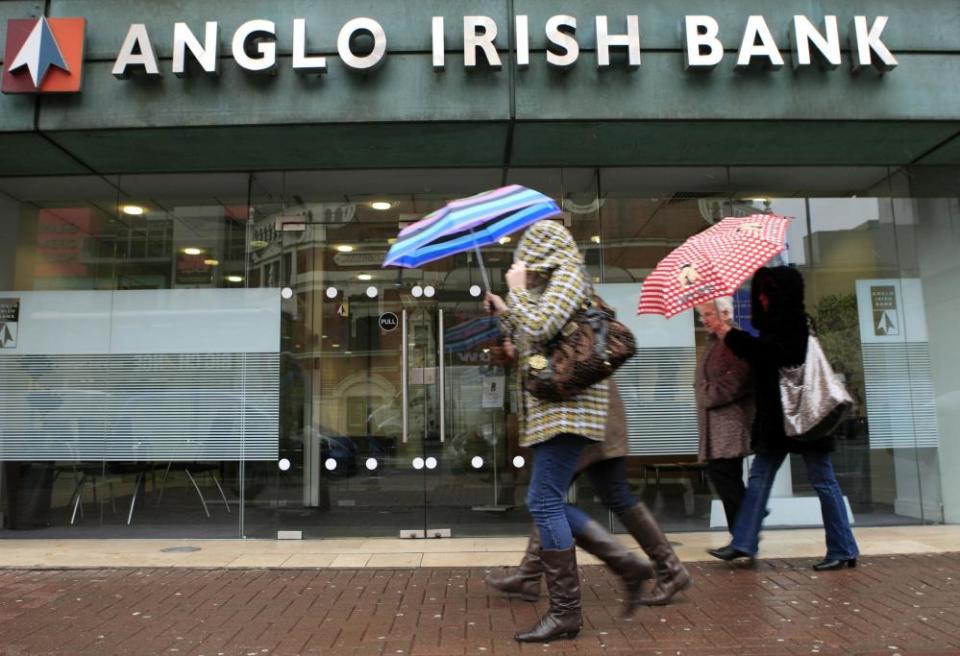Former Anglo Irish chair Seán Fitzpatrick walks free as trial collapses

The chair of the bank that almost bankrupted Ireland has walked free from a Dublin court after being acquitted of misleading auditors about multimillion-euro loans.
Seán Fitzpatrick was once head of the country’s biggest bank, Anglo Irish, which ended up requiring a €30bn (£26bn) government bailout and sent the country cap in hand to the International Monetary Fund for support.
But on Wednesday, after the longest criminal trial in Irish history, a judge ordered the jury to acquit him on all charges.
Later Fitzpatrick stood on the steps of the Republic’s criminal courts of justice and declared: “It’s wonderful day.”
Twenty-four hours earlier Mr Justice John Aylmer had told jurors he was going to direct them to acquit Fitzpatrick. The former executive had pleaded not guilty to misleading the Anglo Irish bank’s auditors about loans to him and people connected to him.
On Wednesday, the 126th day of an at times a bewildering and complex trial, Fitzpatrick’s defence had argued that the case should not go before the jury because of flaws in the investigation and in the prosecution case, which involved coaching witnesses and shredding documents.
The trial judge told Fitzpatrick: “You are free to go; thank you very much for your attendance.”
Fitzpatrick replied: “Thank you, judge” before leaving Dublin circuit criminal court.
Apart from his “wonderful day” comment, Fitzpatrick refused to answer reporters’ questions. He told them: “I don’t want to be rude, but I’m not going to speak. I’m not making any comment.”
Fitzpatrick had pleaded not guilty to 27 offences under the Republic’s 1990 Companies Act. These include 22 charges of making a misleading, false or deceptive statement to auditors and five charges of furnishing false information in the years 2002 to 2007. The Irish director of public prosecutions had dropped some of these charges in the past four weeks.
The case against Fitzpatrick at the Dublin circuit criminal court was a retrial after his first trial in May 2015 ended after weeks of legal argument over the flaws in the investigation by the Republic’s anti-corruption corporate watchdog.
Ireland’s Office of the Director of Corporate Enforcement said on Tuesday it accepted witnesses were coached during the investigation into Fitzpatrick and that their evidence was contaminated.
It also admitted that other documents held by the watchdog were shredded by one its officials. He was said to be under enormous stress at the time. “Those actions clearly should not have occurred,” the ODCE said.
The watchdog admitted there had been “serious failures” in its investigations into the Anglo Irish bankers’ loans. It also confirmed that some of the statements taken in evidence against Fitzpatrick were carried out by “civilian staff” who did not have proper training.

Taoiseach Enda Kenny joined opposition parties in the Dáil in criticising the ODCE’s handling of the investigation.
Kenny said if a government minister had performed as badly as some ODCE officials they would be sacked.
Micheál Martin, leader of the main opposition party Fianna Fáil, also criticised the Garda Siochána for their role in the investigation into white-collar crime that he said had been proved to be “inept, negligible, wasteful and virtually redundant”.
In 2009, Anglo Irish was nationalised, with the Irish taxpayer having to pay €30bn (£23bn) to rescue an institution that was once the preferred bank of builders and property speculators.
The sharp practices at the bank during the Celtic boom, when it became the major financier for overstretched Irish developers and investors playing the global property market, caused national outrage.
At a time of austerity cuts and the country losing its financial independence in the IMF/European Central Bank bailout programme, the sight of billions of taxpayers’ money being used to save Anglo Irish provoked widespread public anger.
One of those who used Anglo Irish to play the global property casino was Ireland’s one-time richest man, Seán Quinn.
Quinn is the former billionaire whose rise and fall while overborrowing from Anglo Irish personifies the collapse of Ireland’s Celtic Tiger economy. The 65-year-old County Fermanagh-born tycoon used to employ up to 5,000 people in construction and his family’s insurance corporation.
He had been previously listed at the richest Irishman in history – with a personal wealth of about €4.7bn.
But Quinn went bankrupt with huge debts, having bought a significant number of shares in the former Anglo Irish Bank with a view to buying a global property empire stretching from North America to parts of the former Soviet Union.

 Yahoo Finance
Yahoo Finance